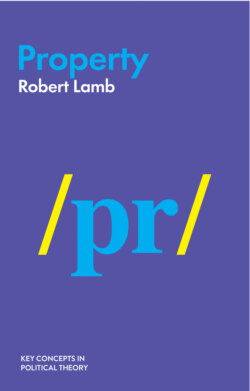Читать книгу Property - Robert Lamb A. - Страница 10
Structure of the book
ОглавлениеIn this chapter, I have raised the thorny issue of defining property as a key concept in political theory. I discussed two contrasting ways of thinking about property: the view that it has an essential conceptual core and the view that it is a misleading notion analysable only when broken down into discrete and specific legal relations. My suggestion is that despite the appeal of the bundle theory, property remains a comprehensive and very powerful point of navigation through a set of ideas, comprising a discernible lineage of political argument. Indeed, as we will see below, various political writers – across philosophical traditions – have sought to define, theorise, and contest the idea of property, even where they disagree about its precise nature.
The structure of the rest of the book is as follows. In the first chapter, I consider why we might think that private property stands in need of a compelling justification. To explain the urgency of this undertaking – beyond the aforementioned habit of political philosophers surveying the world and asking why it is the way it is – I introduce some of the most radical dismissals of the legitimacy of property ownership in Western political thought. After outlining the dramatic critique advanced in the eighteenth century by Jean-Jacques Rousseau, I briefly consider the case against property put forward by writers in the anarchist and socialist traditions, focusing on the thought of Pierre-Joseph Proudhon and William Morris. Much of the case against private property concerns the severe poverty and inequalities that are associated with a world of yours and mine, as well as the claimed appeal of the radically different world that we can imagine without it.
The remainder of the book is a response to this challenge posed by the claimed illegitimacy of private ownership. In the following five chapters, I consider various theoretical attempts to justify property as an institution. In the second and third chapters, I examine an account of ownership within the libertarian tradition, focusing on the construal of property as an inviolable right that implies the wrongness of coercive taxation. I first analyse Robert Nozick’s libertarian political theory, showing how his radical defence of property rights against the state is derivative ultimately from a principle of self-ownership rather than from a commitment to freedom. In the following chapter I uncover the roots of self-ownership through a discussion of the history of the supposed ancestry of libertarian thought (in early modern and modern natural rights theories). I show that, within these historical theories, property rights have traditionally been justified through reference to an overarching account of natural law. My suggestion is that, when unmoored from this account, the modern, secularised principle of self-ownership looks eccentrically individualistic and incapable of sustaining the radical political conclusion advanced by Nozick. While the most obvious place to find a justification for property might seem to be within the libertarian tradition, my suggestion is that philosophers must look elsewhere.
In the fourth and fifth chapters, I consider alternative justifications for property ownership that do not try to defend the institution through reference to natural rights. I look first at the consequentialist accounts of the institution we find in the utilitarian tradition, in the writings of David Hume, Jeremy Bentham, and J. S. Mill. Each uses the idea of utility in a different way to justify the institution of property ownership and its associated legal conventions. After a discussion of the logics that drive them, I conclude that these three different justifications – though they are arresting and again have some intuitive pull – seem likewise incapable of providing a solid foundation for the existence of private property, their vulnerability traceable to the empirical claims upon which they must rely. I then move on, in the fifth chapter, to outline what might be the most compelling justification of private property in modern political thought. This justification, which can be found in the political writing of nineteenth-century German philosopher G. W. F. Hegel, is one that takes seriously the meaning and purpose of property in both its individual and social dimensions. The attraction of the Hegelian justification is, I suggest, that it can account for both the individualistic nature of the institution of private ownership and its ultimately social justification, while being unaffected by the vagaries that would threaten any consequentialist version.
However, while Hegel might provide a convincing account of why property exists, and the forms that it can take, his account is not without difficulties. For one thing, his theory raises the problems of poverty, inequality, and intergenerational injustice – issues on which Hegel is either silent or offers answers that are less than satisfactory. There is something missing from his overall theory that is addressable through a more holistic normative framework. I therefore turn, in the sixth chapter, to consider the case for such a holistic approach, in relation to what John Rawls has termed ‘property-owning democracy’. Rawls’s theory embeds his commitment to property ownership within his broader account of justice, and does so in a way that fuses liberal commitments to freedom and equality. My ultimate conclusion is that private property can indeed be justified as a social institution, but its value as a concept is articulable and appreciable through an overall normative philosophical framework, rather than in isolation. To reach that point, we need to embark on quite a journey. We must first begin, however, by considering the view that the journey is not worth undertaking at all, on the basis that we should reject private property from the outset as an indefensible political institution.
